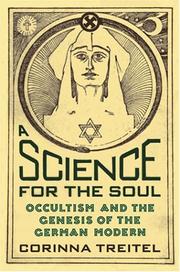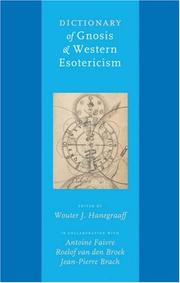| Listing 1 - 10 of 190 | << page >> |
Sort by
|
Book
ISBN: 905617472X Year: 2003 Publisher: Leuven Van Halewyck
Abstract | Keywords | Export | Availability | Bookmark
 Loading...
Loading...Choose an application
- Reference Manager
- EndNote
- RefWorks (Direct export to RefWorks)
Book
ISBN: 9789492499165 Year: 2024 Publisher: Antwerpen Uitgeverij Mediageuzen
Abstract | Keywords | Export | Availability | Bookmark
 Loading...
Loading...Choose an application
- Reference Manager
- EndNote
- RefWorks (Direct export to RefWorks)
Book
ISBN: 0099094207 Year: 1974 Publisher: London Arrow Books Ltd / Hutchinson Publishing Group
Abstract | Keywords | Export | Availability | Bookmark
 Loading...
Loading...Choose an application
- Reference Manager
- EndNote
- RefWorks (Direct export to RefWorks)
witchcraft --- the Cult of Satan --- the Black Mass --- black magic
Book
ISBN: 9020254294 Year: 1981 Publisher: Deventer Ankh-Hermes
Abstract | Keywords | Export | Availability | Bookmark
 Loading...
Loading...Choose an application
- Reference Manager
- EndNote
- RefWorks (Direct export to RefWorks)
Occultism. --- Occultism --- Art, Black (Magic) --- Arts, Black (Magic) --- Black art (Magic) --- Black arts (Magic) --- Occult, The --- Occult sciences --- Religions --- Supernatural --- New Age movement --- Parapsychology

ISBN: 0801878128 9780801878121 Year: 2004 Publisher: Baltimore Johns Hopkins university press
Abstract | Keywords | Export | Availability | Bookmark
 Loading...
Loading...Choose an application
- Reference Manager
- EndNote
- RefWorks (Direct export to RefWorks)
Occultism --- History. --- Art, Black (Magic) --- Arts, Black (Magic) --- Black art (Magic) --- Black arts (Magic) --- Occult, The --- Occult sciences --- Supernatural --- New Age movement --- Parapsychology --- History
Book
ISBN: 2850760161 9782850760167 Year: 1986 Publisher: Dervy-Livres
Abstract | Keywords | Export | Availability | Bookmark
 Loading...
Loading...Choose an application
- Reference Manager
- EndNote
- RefWorks (Direct export to RefWorks)
Occultism --- Art, Black (Magic) --- Arts, Black (Magic) --- Black art (Magic) --- Black arts (Magic) --- Occult, The --- Occult sciences --- Supernatural --- New Age movement --- Parapsychology

ISBN: 1281399841 1780344570 9786611399849 9047410122 9789047410126 9781281399847 9789004152311 9004152318 9004152318 Year: 2006 Publisher: Leiden ; Boston : Brill,
Abstract | Keywords | Export | Availability | Bookmark
 Loading...
Loading...Choose an application
- Reference Manager
- EndNote
- RefWorks (Direct export to RefWorks)
Occultism --- Art, Black (Magic) --- Arts, Black (Magic) --- Black art (Magic) --- Black arts (Magic) --- Occult, The --- Occult sciences --- Supernatural --- New Age movement --- Parapsychology
Book
ISBN: 0511974620 110807264X Year: 2011 Publisher: Cambridge : Cambridge University Press,
Abstract | Keywords | Export | Availability | Bookmark
 Loading...
Loading...Choose an application
- Reference Manager
- EndNote
- RefWorks (Direct export to RefWorks)
The renowned lawyer and journalist Henry Steel Olcott (1832-1907) published this work in 1885. In this work Olcott carefully lays out his arguments for the basis of theosophy, arguing for the truth of all religions because they share the same ancient roots or 'ur-religion'. As a founding member and the first president of the Theosophical Society, Olcott uses the work to set out the aims and objectives of the Society and attempts to reconcile his spiritual beliefs with science, reason and modernity. The work also includes accounts of his attempted empirical investigations into hypnotism, mesmerism and other spiritualist activities. The final chapters include discussions of India, Buddhism and Zoroastrian religion. The work was deeply influenced by Helena Blavatsky (1831-1891), then Olcott's close friend but later his opponent. It is a key text of the nineteenth-century theosophical movement and is an indispensable source for research into Victorian occult philosophy.
Occultism. --- Art, Black (Magic) --- Arts, Black (Magic) --- Black art (Magic) --- Black arts (Magic) --- Occult, The --- Occult sciences --- Occultism --- Supernatural --- New Age movement --- Parapsychology
Book
ISBN: 1139176447 1108044298 Year: 1896 Publisher: Place of publication not identified : Cambridge : publisher not identified, Cambridge University Press
Abstract | Keywords | Export | Availability | Bookmark
 Loading...
Loading...Choose an application
- Reference Manager
- EndNote
- RefWorks (Direct export to RefWorks)
Éliphas Lévi, born Alphonse Louis Constant, (1810-75) was instrumental in the revival of Western occultism in the nineteenth century, and published several influential books on magic that are also reissued in this series. This posthumous publication (1896) is a translation by William Wynn Westcott, co-founder of the 'Hermetic Order of the Golden Dawn', of an unpublished French manuscript by Lévi, then owned by the spiritualist Edward Maitland. It includes eight of the author's drawings. Each short chapter outlines the meaning of one of the twenty-two tarot trumps and is followed by a brief editor's note describing the card's iconography and summarising interpretations (sometimes deliberately misleading) given in Lévi's earlier publications. The book ends with Kabbalistic prayers and rituals, praise of Jesus Christ as the great initiate, and a surprising assertion that Christianity has superseded ancient magic, revealing the life-long tension between Catholicism and magic in Lévi's personality and thought.
Tarot. --- Occultism. --- Art, Black (Magic) --- Arts, Black (Magic) --- Black art (Magic) --- Black arts (Magic) --- Occult, The --- Occult sciences --- Occultism --- Supernatural --- New Age movement --- Parapsychology --- Fortune-telling by cards
Book
ISBN: 1009067133 9781009067133 9781316512401 9781009065870 1316512401 1009079808 1009065874 1009079603 Year: 2022 Publisher: Cambridge : Cambridge University Press,
Abstract | Keywords | Export | Availability | Bookmark
 Loading...
Loading...Choose an application
- Reference Manager
- EndNote
- RefWorks (Direct export to RefWorks)
Belief in magic was, until relatively recent times, widespread in Britain; yet the impact of such belief on determinative political events has frequently been overlooked. In his wide-ranging new book, Francis Young explores the role of occult traditions in the history of the island of Great Britain: Merlin's realm. He argues that while the great magus and artificer invented by Geoffrey of Monmouth was a powerful model for a succession of actual royal magical advisers (including Roger Bacon and John Dee), monarchs nevertheless often lived in fear of hostile sorcery while at other times they even attempted magic themselves. Successive governments were simultaneously fascinated by astrology and alchemy, yet also deeply wary of the possibility of treasonous spellcraft. Whether deployed in warfare, rebellion or propaganda, occult traditions were of central importance to British history and, as the author reveals, these dark arts of magic and politics remain entangled to this day.
Occultism --- Art, Black (Magic) --- Arts, Black (Magic) --- Black art (Magic) --- Black arts (Magic) --- Occult, The --- Occult sciences --- Supernatural --- New Age movement --- Parapsychology --- Political aspects --- History.
| Listing 1 - 10 of 190 | << page >> |
Sort by
|

 Search
Search Feedback
Feedback About UniCat
About UniCat  Help
Help News
News